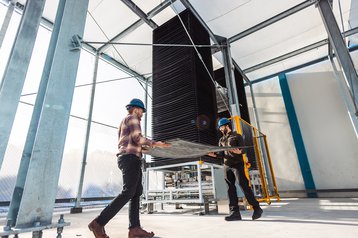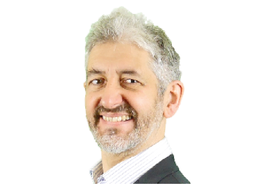Microsoft has signed a large deal with US-based Heirloom Carbon, which will unlock government support and project funding to scale Heirloom's carbon capture business.
Heirloom, of Brisbane, California, is eligible for up to $600 million of matched funding from the US Department of Energy (DOE), after Project Cypress was selected as one of two direct air capture (DAC) hubs. The Cypress project involves technology company Batelle, along with DAC firms Heirloom and Cypress.
Microsoft has previously paid for carbon capture by Climeworks, and bought carbon credits from Heirloom.
Heirloom captures carbon in trays of prepared calcium oxide, which becomes calcium carbonate as CO2 is absorbed. The calcium carbonate is then heated with renewable electricity to remove the CO2, leaving calcium oxide which can be reused. The CO2 is given to concrete maker CarbonCure, to be added to concrete for permanent storage.
Heirloom has contracted to store up to 315,000 metric tons of CO2 removal over a multi-year period, making this one of the largest DAC deals so far.
Carbon capture is widely agreed to be necessary to remove carbon dioxide from the air, if the world is to limit global warming. Most DAC techniques are energy intensive, but Heirloom claims its process uses less energy than competitors.
The deal is "bankable," meaning it provides stable cash flows which should catalyze other investments that will help scale up the technology, allowing Heirloom to open more facilities and develop its process to bring the price and energy usage down.
Heirloom CEO Shashank Samala said: “Microsoft has been an incredible supporter of Heirloom, helping us scale one of the world’s most cost-effective Direct Air Capture solutions. Bankable agreements of this magnitude enable Heirloom to raise project finance for our rapid scale-up, fueling exponential growth like what we’ve seen in the renewable energy industry.”
“It is incredibly encouraging to see agreements of this magnitude because corporate buyers, like Microsoft, can unlock a significantly lower cost of capital for Direct Air Capture companies that are seeking to finance infrastructure projects, such as future carbon dioxide removal facilities,” said Robert Keepers, managing director, J.P. Morgan Green Economy Banking.
The deal will pay for CO2 removed at Heirloom’s next two commercial deployments in the US, and will support Microsoft’s goal to be carbon-negative by 2030.
Microsoft senior director of Energy and Carbon, Brian Marrs, said: “Microsoft’s agreement with Heirloom is another important step in helping build the market for high-quality carbon removal and supports our path to become carbon negative by 2030. As an investor in and customer of Heirloom, we believe that Heirloom’s technical approach and plan are designed for rapid iteration to help drive down the cost of large-scale Direct Air Capture at the urgent pace needed to meet the goals of the Paris Agreement.”




